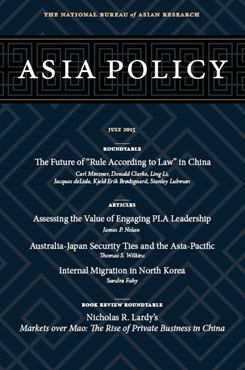The Future of "Rule According to Law" in China
This Asia Policy roundtable contains six essays that discuss the Fourth Plenum’s focus on legal reform and its effects on the relationship between the CCP and the judicial system.
China’s Fourth Plenum focused on the concept of yifa zhiguo, or “rule according to law.” What does this mean for China’s legal infrastructure, the role of the government, and civil society? In this Asia Policy roundtable, six leading scholars examine the legal reforms considered at the Fourth Plenum and assess their effects on the relationship between the CCP and the judicial system. Read the introduction below.
Legal Reform in the Xi Jinping Era Carl Minzner
China’s Legal System and the Fourth Plenum Donald Clarke
The Rule of Law with Xi-Era Characteristics: Law for Economic Reform, Anticorruption, and Illiberal Politics Jacques deLisle
Assessing the Fourth Plenum of the Chinese Communist Party: Personnel Management and Corruption Kjeld Erik Brødsgaard
Conclusion: Stronger and More Professional Courts—But Still Under Party Control Stanley Lubman
Introduction
The Fourth Plenum of the 18th Communist Party of China (CCP) Central Committee, held in October 2014, focused on the concept of yifa zhiguo or “rule according to law.” This theme indicated the CCP’s interest in revitalizing the “China dream” by improving the country’s legal infrastructure while strengthening the party’s authority over the enforcement of laws and legal institutions. Reactions to the Decision document issued by the party after the Fourth Plenum ranged from optimistic to skeptical about the prospects for meaningful reform. At one end of the spectrum, optimistic observers have envisioned a strengthening of the judiciary to place party and government officials under constitutional and legislative constraints. They point to proposed administrative reforms that would reinforce central control over local courts and lessen the dependence of basic-level judges on local officials, which fuels legal transgressions and corruption. At the other end, skeptics have noted that the decision issued from the Fourth Plenum repeatedly states that the judiciary and its officials shall remain under the firm leadership of the CCP. These observers view the Fourth Plenum pronouncements as an exercise in a more transparent, rules-based dictatorship, in which the CCP’s anticorruption officials and government prosecutors will have clearer instructions and procedures for exercising repressive controls over both corrupt officials and anyone deemed a threat to the party and the state.
This Asia Policy roundtable contains six essays that discuss the Fourth Plenum’s focus on legal reform and its effects on the relationship between the CCP and the judicial system. Carl Minzner examines the shifts in China’s legal reforms over the past decades and the institutional factors that will likely direct state efforts in the legal field in the years ahead. Donald Clarke outlines the more and less meaningful reforms to the legal system in the Fourth Plenum Decision, while also considering enduring obstacles to rule of law. Ling Li explains the limitations of the judicial system and how the reform measures of the Fourth Plenum address the structural defects of the party-state’s institutional design. Jacques deLisle assesses the evolving roles of law in economic reform, the anticorruption campaign, and political change in China. Kjeld Erik Brødsgaard discusses the Fourth Plenum’s focus on centralizing personnel management and supervision authority and maintains that the reform of the judicial system does not coincide with a reduction of the CCP’s power. Stanley Lubman concludes the roundtable with an overview of these essays and considers the strength of China’s legal culture in the short and longer term.
As these authors all observe, the Fourth Plenum represents the CCP leadership’s emphasis on rule of law as part of solving some of China’s most pressing problems and strengthening the country’s governance. Although the CCP intends to enhance the role of the courts in the party-state governing structure and reduce the interference of local officials in court proceedings, many questions remain concerning China’s legal environment and the continued primacy of the party, which remains above the law and constitution. The roundtable authors expand on the implications of the Fourth Plenum’s reform measures and explain how the reforms proposed demonstrate the party’s continued use of law as a tool for achieving its own objectives and eliminating threats to its future by both corrupt officials and by ideological alternatives. They conclude that while the Fourth Plenum marks the beginning of China’s struggle to build a more independent and professionalized judiciary separated from local interests, it also underscores the CCP’s sustained leadership over the Chinese legal system.
About Asia Policy
Asia Policy is a peer-reviewed scholarly journal presenting policy-relevant academic research on the Asia-Pacific that draws clear and concise conclusions useful to today’s policymakers. Asia Policy is published quarterly in January, April, July, and October and accepts submissions on a rolling basis. Learn more


